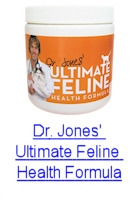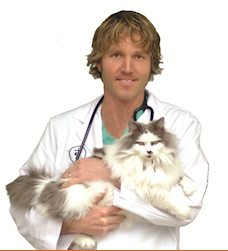|
Hi Friend,
Good morning and welcome to Monday...
Today's article is on an ever present threat to our pets, and further reinforces why we need to make changes.
That being said, while these changes slowly happen, you should really be giving your dogs and cats nutrients that fortify their immune system.
Such as anitoxidants, essential fatty acids, colostrum and probiotics.
You can get these in my supplements:
http://www.thedogsupplement.com
http://www.thecatsupplement.com
------------------------------------------------------
Ever wonder why there is so much cancer?
------------------------------------------------------
Rachel Carson's Silent Spring warned us of the threats to life attending widespread use of chemical pesticides. As a result of her effort the EPA was founded in 1970 and DDT was banned in 1972. Nevertheless, we did not curtail our domestic reliance on toxic chemicals for pest control. The yearly amount of pesticide sold is now more than double the amount marketed in 1962 when Silent Spring was published.
Pesticide residues in our food and in the environment reflect years of chemical production and use.
We face the continuing problems of the toxic by-products of manufacturing, runoff from outdoor applications, ground water contamination, and finally disposal of unused material as hazardous waste.
Pesticides are used in virtually all public buildings, golf courses, schools, restaurants, hotels, hospitals and private homes as well as in agriculture and forestry.
Rachel Carson described the detrimental effects of pesticides on animals including robins, caddis fly larvae, quail, salmon, and cats. Silent Spring shows clearly how deeply caring and fiercely protective Rachel Carson was of wildlife. Her concern extended to pet animals as well.
Cancer is one of the leading causes of death in dogs and cats today. Compared to humans, dogs develop tumors twice as frequently.
The incidence of cancer in domestic animals has risen dramatically in the past several years, especially in dogs and cats. Some 70 types of cancers have been identified-one reputable source indicates that 47 percent of dogs over 10 years of age now die of cancer. No one cause has been attributed to this rise, however, several factors have been implicated. These include environmental factors, such as pesticides and herbicides, increasing longevity, diet, genetics, viruses, and more.
2,4-D and Increased Cancer Risk
A 1991 National Cancer Institute study found that dogs whose owners' lawns were treated with 2,4-D (2,4-dichlorophenoxy acetic acid), four or more times per year, were twice as likely to contract canine malignant lymphoma than dogs whose owners did not use the herbicide. Incidentally, malignant lymphoma in dogs is considered very similar to non-Hodgkin's lymphoma in humans. Studies in rats have demonstrated that 2,4-D can migrate into nervous tissue and concentrate in certain areas of the brain. Not too surprisingly, behavioral changes have also been observed in treated rats (Evangelista de Duffard 1990).
This herbicide was a component of Agent Orange, and is the active ingredient in many herbicide products on the market.
------------------------------------------------------------
Insecticides Associated with Bladder Cancer in Dogs
-------------------------------------------------------------
A statistically significant association between exposure to topical flea and tick dips, and the occurrence of bladder cancer in dogs has been found. The risk of bladder cancer was increased further in dogs living in proximity to areas sprayed regularly with insecticides for mosquitoes.
An increased rate of bladder cancer in humans has recently been reported (Journal of Toxicology and Environmental Health, 1989(28): 407-414). Chemical pesticides have been associated with increased aggression in cats and people, enlarged thyroid glands in cats, bladder cancer and lymphosarcoma in dogs, breast cancer in people and fatalities in birds.
Minimal effort has been expended in studying pet animal populations for long-term chemical pesticide toxicity, but careful analysis of animal disease and pesticide exposure has detected significant associations.
Much more such work could and should be done. The medical and environmental communities need to join forces in investigating pesticide-related illness.
As Rachel Carson wrote in Silent Spring: "Today we are concerned with a different kind of hazard that lurks in our environment--a hazard we ourselves have introduced into our world as our modern way of life has evolved." Dogs, cats and birds have been our companions for centuries.
Their behavior, diseases and even their deaths have warned us of pesticide related health and environmental problems.
Many people assume that since lawn pesticides (also widely used on golf courses) are so common, they must not be harmful. The truth is that just because a pesticide is registered with the EPA does not necessarily guarantee its safety. If you are at all concerned about being exposed to pesticides, you should be doubly concerned for your pets.
Healthy lawns can be achieved with non-toxic methods. Soil aeration, correct mowing, organic fertilizers, vinegar and corn gluten are just some of the available alternatives to toxic chemicals.
Heal Your Pet At Home!
Best Wishes,
Dr Andrew Jones, DVM
P.S. Neutraceuticals are KEY in treating and preventing diseases associated with toxins.
These include Essential Fatty Acids, Probiotics, and even Colostrum. ALL of these can be found in my supplement.
You can get a 50% OFF trial here:
http://www.thedogsupplement.com
http://www.thecatsupplement.com

DISCLAIMER: This information is for educational purposes only and is not intended to replace the advice of your own veterinarian. Dr Andrew Jones resigned from the College of Veterinarians of B.C. effective December 1 2010, meaning he cannot answer specific questions about your pet's medical issues or make specific medical recommendations for your pet.
PRIVACY POLICY: We will never rent, sell, loan, provide, barter, exchange or in any way make available your personal information to others. You can unsubscribe or change your email address at any time using the links at the bottom of this email.
Copyright 2012 Four Paws Online Ltd.
Tel: 1-800-396-1534
Fax: 1-888-398-1378
www.theonlinevet.com
support@fourpawsonlineltd.com
|